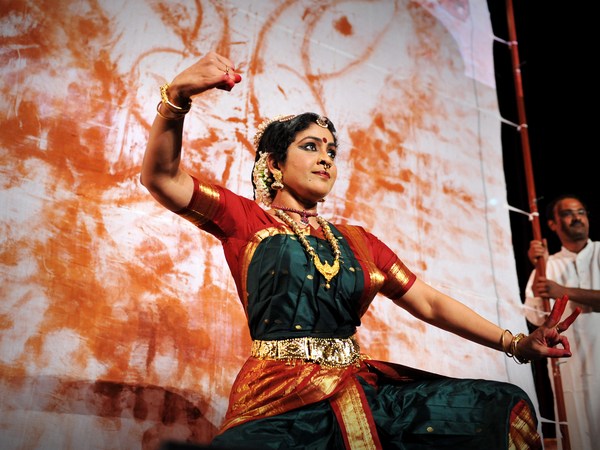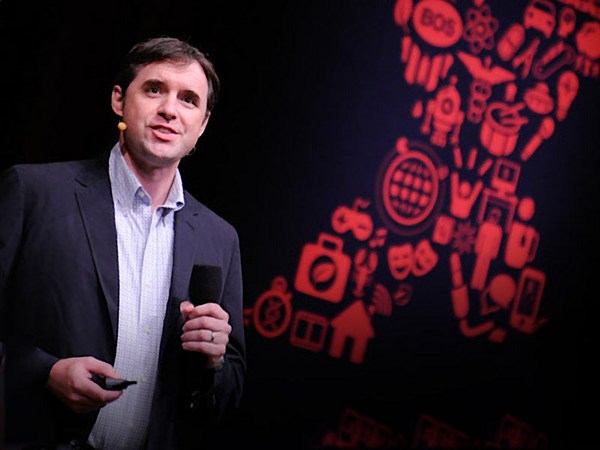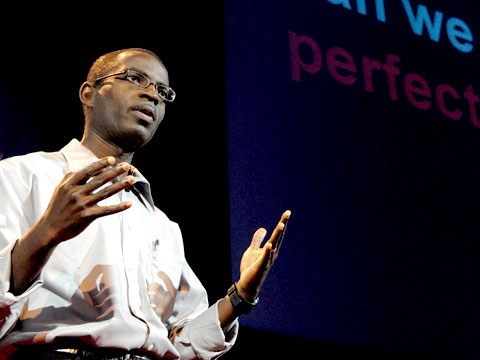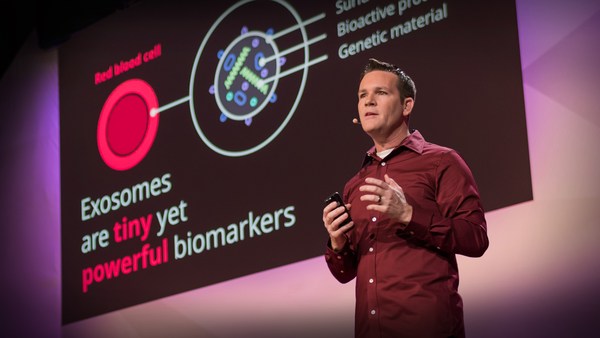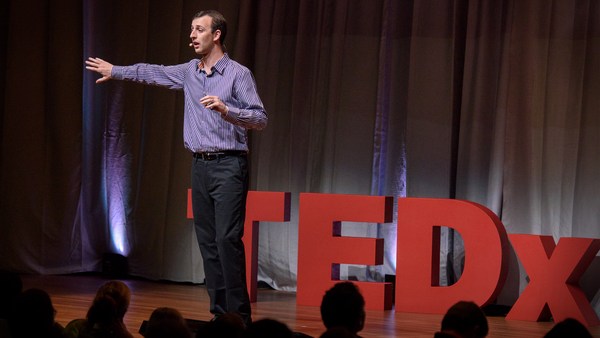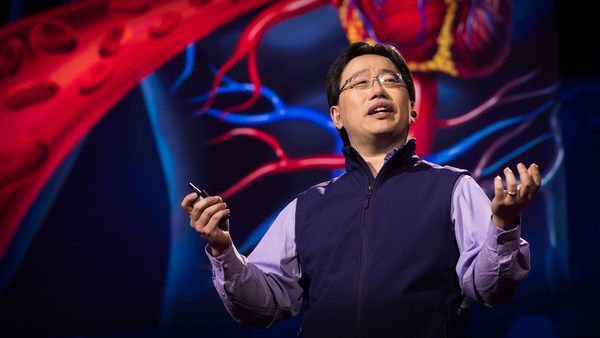This back here was my brain cancer. Isn't it nice? (Laughter) The key phrase is "was," phew. (Applause)
Having brain cancer was really, as you can imagine, shocking news for me. I knew nothing about cancer. In Western cultures, when you have cancer, it's as if you disappear in a way. Your life as a complex human being is replaced by medical data: Your images, your exams, your lab values, a list of medicines. And everyone changes as well. You suddenly become a disease on legs. Doctors start speaking a language which you don't understand. They start pointing their fingers at your body and your images. People start changing as well because they start dealing with the disease, instead of with the human being. They say, "What did the doctor say?" before even saying, "Hello."
And in the meanwhile, you're left with questions to which nobody gives an answer. These are the "Can I?" questions: Can I work while I have cancer? Can I study? Can I make love? Can I be creative? And you wonder, "What have I done to deserve this?" You wonder, "Can I change something about my lifestyle?" You wonder, "Can I do something? Are there any other options?"
And, obviously, doctors are the good guys in all these scenarios, because they are very professional and dedicated to curing you. But they also are very used to having to deal with patients, so I'd say that they sometimes lose the idea that this is torture for you and that you become, literally, a patient -- "patient" means "the one who waits." (Laughter) Things are changing, but classically, they tend to not engage you in any way to learn about your condition, to get your friends and family engaged, or showing you ways in which you can change your lifestyle to minimize the risks of what you're going through. But instead, you're forced there to wait in the hands of a series of very professional strangers.
While I was in the hospital, I asked for a printed-out picture of my cancer and I spoke with it. It was really hard to obtain, because it's not common practice to ask for a picture of your own cancer. I talked to it and I said, "Okay, cancer, you're not all there is to me. There's more to me. A cure, whichever it is, will have to deal with the whole of me." And so, the next day, I left the hospital against medical advice. I was determined to change my relationship with the cancer and I was determined to learn more about my cancer before doing anything as drastic as a surgery.
I'm an artist, I use several forms of open-source technologies and open information in my practice. So my best bet was to get it all out there, get the information out there, and use it so that it could be accessed by anyone. So I created a website, which is called La Cura, on which I put my medical data, online. I actually had to hack it and that's a thing which we can talk about in another speech. (Laughter) I chose this word, La Cura -- La Cura in Italian means "the cure" -- because in many different cultures, the word "cure" can mean many different things. In our Western cultures, it means eradicating or reversing a disease, but in different cultures, for example, a culture from Asia, from the Mediterranean, from Latin countries, from Africa, it can mean many more things.
Of course, I was interested in the opinions of doctors and healthcare providers, but I was also interested in the cure of the artist, of the poet, of the designer, of, who knows, the musicians. I was interested in the social cure, I was interested in the psychological cure, I was interested in the spiritual cure, I was interested in the emotional cure, I was interested in any form of cure.
And, it worked. The La Cura website went viral. I received lots of media attention from Italy and from abroad and I quickly received more than 500,000 contacts -- emails, social networking -- most of them were a suggestion on how to cure my cancer, but more of them were about how to cure myself as a full individual. For example, many thousands of videos, images, pictures, art performances were produced for La Cura. For example, here we see Francesca Fini in her performance. Or, as artist Patrick Lichty has done: He produced a 3D sculpture of my tumor and put it on sale on Thingiverse. Now you can have my cancer, too! (Laughter) Which is a nice thing, if you think about it, we can share our cancer.
And this was going on -- scientists, the traditional medicine experts, several researchers, doctors -- all connected with me to give advice. With all this information and support, I was able to form a team of several neurosurgeons, traditional doctors, oncologists, and several hundred volunteers with whom I was able to discuss the information I was receiving, which is very important. And together, we were able to form a strategy for my own cure in many languages, according to many cultures. And the current strategy spans the whole world and thousands of years of human history, which is quite remarkable for me. [Surgery]
The follow-up MRIs showed, luckily, little to no growth of the cancer. So I was able to take my time and choose. I chose the doctor I wanted to work with, I chose the hospital I wanted to stay in, and in the meanwhile, I was supported by thousands of people, none of whom felt pity for me. Everyone felt like they could take an active role in helping me to get well, and this was the most important part of La Cura.
What are the outcomes? I'm fine, as you can see, pretty fine. (Applause) I had excellent news after the surgery -- I have -- I had a very low-grade glioma, which is a "good" kind of cancer which doesn't grow a lot. I have completely changed my life and my lifestyle. Everything I did was thoughtfully designed to get me engaged.
Up until the very last few minutes of the surgery, which was very intense, a matrix of electrodes was implanted in my brain from this side, to be able to build a functional map of what the brain controls. And right before the operation, we were able to discuss the functional map of my brain with the doctor, to understand which risks I was running into and if there were any I wanted to avoid. Obviously, there were. [Open]
And this openness was really the fundamental part of La Cura. Thousands of people shared their stories, their experiences. Doctors got to talk with people they don't usually consult when they think about cancer. I'm a self-founding, continuous state of translation among many different languages, in which science meets emotion and conventional research meets traditional research. [Society]
The most important thing of La Cura was to feel like a part of a really engaged and connected society whose wellness really depends on the wellness of all of its components. This global performance is my open-source cure for cancer. And from what I feel, it's a cure for me, but for us all.
Thank you.
(Applause).
